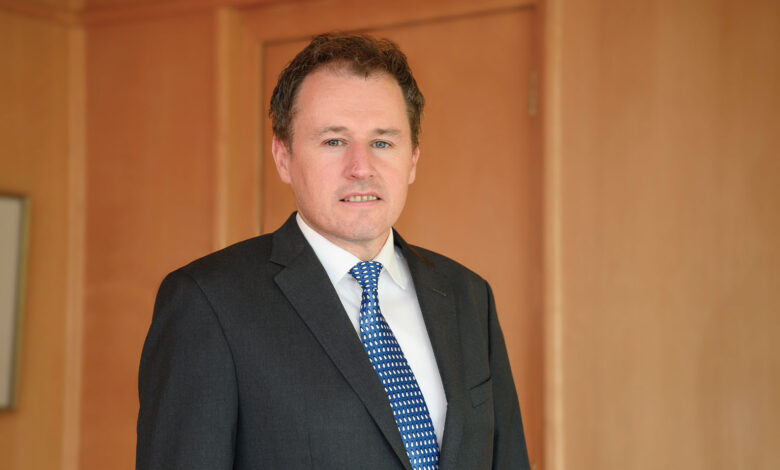Agriculture Minister Charlie McConalogue TD: An agri-led and farmer centric sustainable biomethane industry

The Government has set ambitious targets for sectoral emissions reductions, and I have recognised that central to success is the role that the agriculture sector and its farmers can play in the decarbonisation of the energy system. Minister for Agriculture, Food and the Marine, Charlie McConalogue TD, writes.
This is for very good reason. Ireland is acknowledged by the European Commission as having one of the largest potentials for biomethane production in Europe on a per capita basis. This is due to our substantial agriculture sector and grass-based systems.
As Minister for Agriculture, Food and the Marine, it is my responsibility to both explore and support all opportunities that can galvanise the economic and sustainable future of the agriculture sector. Suffice it to say, I foresee several benefits being realised, aside from the delivery of renewable energy targets, with the development of an agri-led biomethane industry. There are opportunities for farmers, for example, through land diversification opportunities, biobased fertiliser replacing chemical fertiliser, and carbon sequestration on land.
This government is investing in sustainably produced biomethane because it will make an important contribution to achieving Ireland’s 2030 climate targets. An all-of-industry effort is required to meet the ambitious 2030, 5.7 TWh from biomethane target published by the Department for Environment, Climate and Communications (DECC) in 2022. I want to recognise that we are not alone in this endeavour, with major agri-food, drinks, and biopharma companies committed to developing an indigenous, renewable gas industry as a means of reducing their own carbon footprint.
Today, however, Ireland relies heavily on imported fossil gas, with circa 75 per cent of gas consumption being imported via the UK in 2023. Research from the MaREI institute has shown that Ireland spends over €1 million every hour importing fossil fuels into the State. Our target for biomethane is equivalent to 10 per cent of our current national gas demand and farmers will be key players in achieving this goal. This is because there is not sufficient accessible waste in Ireland to meet the requirements and therefore, developing a biomethane industry at scale, simply cannot happen without farmers supplying agricultural feedstock.
It is estimated that over 80 per cent of biomethane will be produced from grass silage and cattle slurry. Teagasc, our agricultural research body, estimates that approximately 20 per cent of all winter cattle slurry produced and approximately 120,000ha of silage, or just under 3 per cent of available agricultural land, will be required to feed these AD plants. Farmers are uniquely positioned and qualified to produce this feedstock and for this reason, it is envisaged that most developments will occur in rural Ireland. It is estimated that development of a biomethane industry in Ireland could lead to the creation of 3,000 to 5,000 jobs and provide rural communities with opportunities to diversify their income towards energy production.
I believe it is important to recognise the role of the farming community in their contribution to the broader decarbonisation agenda and to raise awareness within that community of the longer-term benefits such as bio fertilisers and digestates. We also need to acknowledge and work with rural communities where anaerobic digestion (AD) plants are located. While a well-proven technology, biomethane, and anaerobic digestion are relatively new and unknown renewable energy technologies to many in Ireland. The success of the industry will rely on good local stakeholder engagement, as well as broader national information.
In this respect, I was delighted to publish the National Biomethane Strategy in May 2024 along with my colleague, Minister for the Environment, Climate, Communications, Eamon Ryan TD. This strategy is Ireland’s first major policy statement on biomethane and an important milestone in the development of an indigenous sector. It is, however, just the start of the process, implementing it along with industry will be key to developing a sustainable biomethane industry in Ireland.
A successful biomethane industry will be accomplished by delivering on the 25 key actions set out in the strategy. There are ambitious timelines associated to these actions and a Biomethane Implementation Group has been established to monitor impact and delivery of these initial measures and to identify further actions to support overall target delivery.
“Developing a biomethane industry at scale, simply cannot happen without farmers supplying agricultural feedstock.”
Minister for Agriculture, Food and the Marine, Charlie McConalogue TD
I recognised early on that the biomethane industry would need capital support to be kick-started and to this end, I secured €40 million in funding to help support the initial development of biomethane in Ireland. Upon publication of the National Biomethane Strategy, I immediately opened an expression of interest for the capital scheme and the sector have responded. While I will continue to advocate for further funding to be made available from the Climate and Nature Fund from 2026, I was delighted with the response to this initial funding that confirmed both a strong demand and a readiness to invest before applications closed on the 30 August 2024. Successful applicants that meet the scheme eligibility and selection criteria can receive grant aid of 20 per cent of investment up to a maximum of €5 million.
In conclusion, I am hugely optimistic about the direction and the potential of biomethane production over the next decade and beyond. I look forward to working with all stakeholders in the industry to ensure the National Biomethane Strategy is a success, and I hope to be able to reflect in 2030 on a thriving sustainable biomethane industry, delivering the full range of benefits that AD has to offer.





